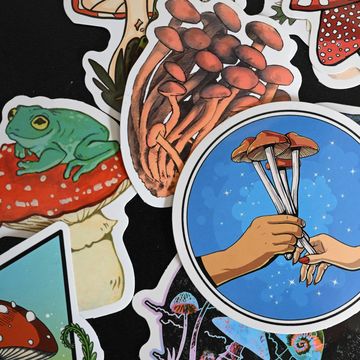With the list of things that make us unhappy growing ever longer - social media, smart phones, Donald Trump - some news about what makes us cheerful is more than welcome.
Last year the University of Warwick revealed the huge psychological benefits you get from increasing your daily uptake of fruit and vegetables. Researchers found that more than 12,000 monitored subject's moods were vastly improved when upping their intake to 8 fruit and vegetables a day.
If that sounds like a large commitment, fear not - we've found some achievable habits science says will make you happy, some of which you may already do. No need to wait for snowfall, a bank holiday or morning sex, because happiness is around the corner.
Watching sad films
Bawling your eyes out to 12 Years A Slave (or Bladerunner, lets be honest) not sound like the cheerful remedy you had in mind? Truth is, emotive and distressing films may put you in a better mental place. A study in Ohio found that feeling low on fiction leads to feeling high on life by measuring their feelings toward their goals, relationships and health before and after watching the incredibly bleak film Atonement.
Surprisingly, participants responded as happier with all of these aspects of their lives after seeing the film, presumably relieved they haven't contracted septicemia at the battle of Dunkirk.
Living somewhere rural
More jobs, cooler people and a Pret on every corner - living in a major city is often regarded as a way to a fulfilling and prosperous life. But small communities might have much more to offer in terms of your spiritual well-being according to what the British Psychological Society refer to as 'The Savannah Theory of happiness.'
Their experiment found that "population density is negatively associated with life satisfaction", a phenomenon also referred to as the ''urban-rural happiness gradient". So when your friends all start leaving London to settle down, you'll know why.
Wearing sunglasses
Just like smiling can trick our brains into feeling happy, squinting can mimic the feeling of frowning and therefore sadness. You might look a fool donning shades in torrential rain, but wearing sunglasses can change your mood, according to - you guessed it - science.
The Week spoke to Alex Korb, professor of Neuroscience at UCLA who said that "When you're looking at bright lights you have this natural reaction to squint. But that often has the unintended effect of you flexing this particular muscle, the "corrugator supercilii." Putting on sunglasses stops your brain from thinking, 'Oh my God, I must be worried about something' It's really just a simple little interruption of that feedback loop."
Taking the tube
Public transport often feels like the worst part of your working day. Smelly food, smellier people, endlessly being told to mind the gap.
Turns out you might be taking your commute for granted as chances are it's bringing you untold joy. OK, that might be a stretch, but researchers in Sweden got participants who normally drove to work to ride the tube for a month and got some surprising results.
They were asked the same questions about their well being and happiness before, during and after the month. Over the course of the study their mood towards the tube improved and by the end of the month their general happiness was much higher. TFL will probably start charging a happiness tax soon, so enjoy it whilst you can.
Thinking about death
Despite the fact that pondering your own mortality sounds like literally the most depressing thing you could ever do, research suggests it can actually give you a more positive outlook.
In one experiment, one group walked past a cemetery and another walked a block away next to nothing in particular. An actor would pass both groups and "accidentally" drop a notebook by them. The group closer to the cemetery was 40 percent more likely to help the actor pick up the notebook. Researchers concluded this was because they were thinking about death, and therefore felt more charitable. Thinking about death has also been shown to make you more mindful and appreciative of your lot in life and not sweat the small stuff.
Getting into fights
Although it might be difficult to regularly get into a scuffle without risking your front teeth, fighting does trigger the release of dopamine - the same chemical which is produced when we get steamy. One study on mice tested their aggression by adding an intruder mouse to another mouse's home environment, causing them to fight. When the 'home mouse' was placed in another cage he was able to press a button to let the intruder in to fight, which he did, repeatedly.
Whilst beating the hell out of someone for your daily fix of joy sounds a little too Fight Club to us, a combative sport like boxing is a way to release the same feelings without getting arrested.














